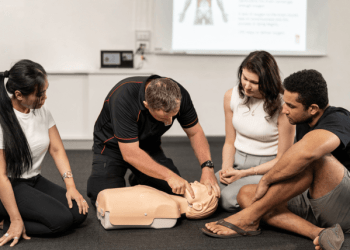Executive leadership is a crucial aspect of organizational management, responsible for setting the overall direction and strategy of a company. Leaders in these roles are tasked with developing and communicating a clear vision, making critical decisions, and guiding the organization towards its goals. They play a pivotal role in shaping company culture, fostering innovation, and ensuring operational efficiency.
What you learn when undertaking leadership development is that key responsibilities of executive leaders include strategic planning, resource allocation, and performance management. They must navigate complex business environments, adapt to market changes, and address challenges that arise. Effective executive leadership requires a combination of skills, including strong communication, decision-making, problem-solving, and interpersonal abilities.
Successful executive leaders possess a range of qualities, such as visionary thinking, emotional intelligence, and the ability to inspire and motivate others. They must balance short-term objectives with long-term sustainability, while also maintaining ethical standards and corporate social responsibility. Executive leaders are accountable for the overall performance of the organization and must build trust with stakeholders, including employees, shareholders, customers, and the broader community.
The impact of executive leadership extends beyond the organization itself, often influencing industry trends and broader economic landscapes. As such, these leaders must stay informed about global developments, technological advancements, and evolving business practices to ensure their organizations remain competitive and relevant in a rapidly changing world.
Key Takeaways
- Executive leadership involves setting the vision, direction, and strategy for an organization, as well as inspiring and motivating employees to achieve goals.
- Leadership skills can be developed through self-awareness, learning from experiences, seeking feedback, and continuous improvement.
- Effective communication and influence are essential for gaining buy-in, building trust, and inspiring others to take action.
- Strategic decision making and problem solving require critical thinking, analysis, and the ability to weigh risks and opportunities.
- Building and leading high-performing teams involves creating a positive and inclusive work environment, fostering collaboration, and empowering team members to excel.
Identifying and Developing Leadership Skills
Key Leadership Skills
Communication skills are vital for executive leaders, as they must be able to effectively convey their vision and goals to their teams, as well as build strong relationships with stakeholders. Decision-making skills are also crucial, as executive leaders are often required to make tough decisions under pressure. Strategic thinking is important for setting long-term goals and navigating through challenges, while emotional intelligence is essential for understanding and managing the emotions of oneself and others.
Developing Leadership Skills
Developing these leadership skills requires a combination of self-awareness, education, and experience. Self-awareness is important for understanding one’s strengths and weaknesses as a leader, and for identifying areas for improvement. Education can come in the form of formal leadership training programs, as well as reading books and articles on leadership and management. Experience is also crucial for developing leadership skills, as it provides opportunities to practice and refine these skills in real-world situations.
Ongoing Development and Support
Additionally, seeking out mentorship from experienced leaders can provide valuable guidance and support in developing leadership skills. Overall, identifying and developing leadership skills is an ongoing process that requires dedication and a willingness to learn and grow as a leader.
Effective Communication and Influence
Effective communication and influence are essential skills for executive leaders, as they are responsible for conveying their vision and goals to their teams, as well as building strong relationships with stakeholders. Effective communication involves not only being able to convey information clearly and concisely, but also being able to listen actively and empathetically. Executive leaders must be able to communicate their expectations and provide feedback to their teams in a way that is constructive and motivating.
They must also be able to build rapport with their teams and other stakeholders in order to gain their trust and support. Influence is also a key aspect of executive leadership, as leaders must be able to inspire and motivate their teams to achieve the company’s goals. This involves being able to lead by example, as well as being able to articulate a compelling vision that resonates with others.
Executive leaders must also be able to build coalitions and alliances within the organization in order to drive change and achieve buy-in from key stakeholders. Overall, effective communication and influence are critical skills for executive leaders in order to drive the organization forward and achieve its long-term success.
Strategic Decision Making and Problem Solving
Strategic decision making and problem solving are essential skills for executive leaders, as they are often required to make tough decisions under pressure. Strategic decision making involves being able to think critically and analytically in order to assess the potential impact of a decision on the organization’s long-term goals. It also involves being able to weigh the pros and cons of different options and make decisions that are aligned with the company’s overall strategy.
Problem solving is also crucial for executive leaders, as they must be able to navigate through challenges and setbacks in order to keep the organization moving forward. Developing these skills requires a combination of experience, education, and critical thinking. Experience provides opportunities to practice strategic decision making and problem solving in real-world situations, while education can come in the form of formal training programs or seeking out mentorship from experienced leaders.
Critical thinking is also important for developing these skills, as it involves being able to analyze complex situations and make informed decisions based on available information. Overall, strategic decision making and problem solving are essential skills for executive leaders in order to navigate through challenges and setbacks and keep the organization on track towards its long-term goals.
Building and Leading High-Performing Teams
Building and leading high-performing teams is a critical responsibility for executive leaders, as the success of the organization depends on the performance of its teams. Building high-performing teams involves being able to recruit and retain top talent, as well as creating a positive and productive work environment that fosters collaboration and innovation. Executive leaders must also be able to provide clear direction and support to their teams in order to help them achieve their goals.
Leading high-performing teams involves being able to inspire and motivate team members, as well as holding them accountable for their performance. Executive leaders must be able to provide constructive feedback and support for their teams in order to help them grow and develop. They must also be able to build trust with their teams in order to create a strong foundation for collaboration and success.
Overall, building and leading high-performing teams is a critical responsibility for executive leaders in order to drive the organization forward and achieve its long-term success.
Managing Change and Adaptability
Anticipating and Managing Change
Executive leaders must possess the skills to navigate through changes in the business environment to keep their organization moving forward. This involves anticipating potential changes and developing strategies to manage them effectively. Clear communication of changes and providing support to impacted employees are also crucial aspects of change management.
The Importance of Adaptability
Adaptability is a vital skill for executive leaders, as they need to adjust their strategies and plans in response to changes in the business environment. Developing adaptability requires a combination of resilience, flexibility, and strategic thinking. Resilience enables leaders to bounce back from setbacks, while flexibility allows them to be open-minded and adjust plans according to new information or changing circumstances.
Key Skills for Success
Strategic thinking is essential for developing effective change management strategies that align with the company’s overall goals. By possessing these skills, executive leaders can ensure their organization remains agile and responsive to changes in the business environment. Ultimately, managing change and adaptability are essential skills for executive leaders to drive their organization forward.
Sustaining Leadership Growth and Development
Sustaining leadership growth and development is an ongoing process that requires dedication and a willingness to learn and grow as a leader. This involves seeking out opportunities for continued education and development, such as formal training programs or seeking out mentorship from experienced leaders to study leadership in Australia. It also involves seeking feedback from others in order to identify areas for improvement and growth.
Additionally, sustaining leadership growth requires being open-minded and willing to adapt one’s leadership style in response to new challenges or opportunities. Developing these skills requires a combination of self-awareness, education, experience, resilience, flexibility, strategic thinking, critical thinking, emotional intelligence, communication skills, influence skills, decision-making skills, problem-solving skills, team-building skills, change management skills, adaptability skills, feedback-seeking skills, mentorship-seeking skills. In conclusion, executive leadership is a critical component of any organization’s success.
It requires a unique set of skills and qualities in order to be successful, including effective communication, strategic decision making, team building, change management, adaptability, influence, problem solving among others. Developing these skills requires dedication, self-awareness, education, experience, resilience among others. Sustaining leadership growth requires continued education, feedback-seeking behavior among others.
Overall, effective executive leadership is essential for driving the organization forward towards its long-term success.











